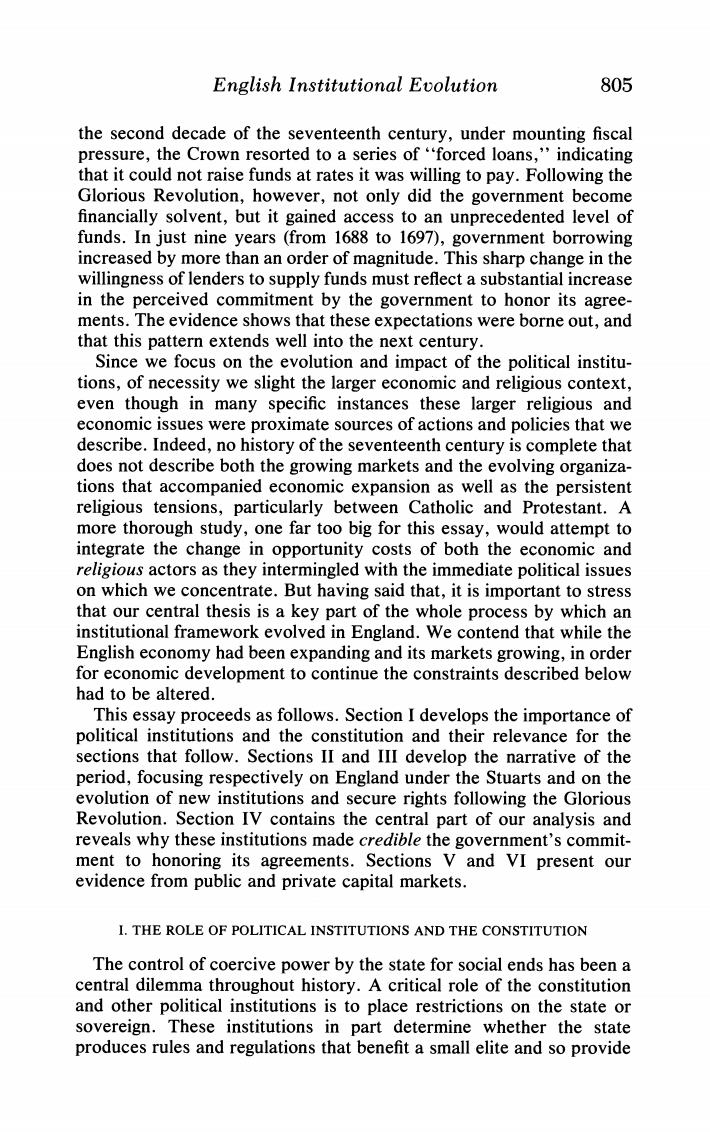正在加载图片...

English Institutional Evolution 805 the second decade of the seventeenth century,under mounting fiscal pressure,the Crown resorted to a series of"forced loans,'indicating that it could not raise funds at rates it was willing to pay.Following the Glorious Revolution,however,not only did the government become financially solvent,but it gained access to an unprecedented level of funds.In just nine years (from 1688 to 1697),government borrowing increased by more than an order of magnitude.This sharp change in the willingness of lenders to supply funds must reflect a substantial increase in the perceived commitment by the government to honor its agree- ments.The evidence shows that these expectations were borne out,and that this pattern extends well into the next century. Since we focus on the evolution and impact of the political institu- tions,of necessity we slight the larger economic and religious context, even though in many specific instances these larger religious and economic issues were proximate sources of actions and policies that we describe.Indeed,no history of the seventeenth century is complete that does not describe both the growing markets and the evolving organiza- tions that accompanied economic expansion as well as the persistent religious tensions,particularly between Catholic and Protestant.A more thorough study,one far too big for this essay,would attempt to integrate the change in opportunity costs of both the economic and religious actors as they intermingled with the immediate political issues on which we concentrate.But having said that,it is important to stress that our central thesis is a key part of the whole process by which an institutional framework evolved in England.We contend that while the English economy had been expanding and its markets growing,in order for economic development to continue the constraints described below had to be altered. This essay proceeds as follows.Section I develops the importance of political institutions and the constitution and their relevance for the sections that follow.Sections II and III develop the narrative of the period,focusing respectively on England under the Stuarts and on the evolution of new institutions and secure rights following the Glorious Revolution.Section IV contains the central part of our analysis and reveals why these institutions made credible the government's commit- ment to honoring its agreements.Sections V and VI present our evidence from public and private capital markets. I.THE ROLE OF POLITICAL INSTITUTIONS AND THE CONSTITUTION The control of coercive power by the state for social ends has been a central dilemma throughout history.A critical role of the constitution and other political institutions is to place restrictions on the state or sovereign.These institutions in part determine whether the state produces rules and regulations that benefit a small elite and so provideEnglish Institutional Evolution 805 the second decade of the seventeenth century, under mounting fiscal pressure, the Crown resorted to a series of "forced loans," indicating that it could not raise funds at rates it was willing to pay. Following the Glorious Revolution, however, not only did the government become financially solvent, but it gained access to an unprecedented level of funds. In just nine years (from 1688 to 1697), government borrowing increased by more than an order of magnitude. This sharp change in the willingness of lenders to supply funds must reflect a substantial increase in the perceived commitment by the government to honor its agreements. The evidence shows that these expectations were borne out, and that this pattern extends well into the next century. Since we focus on the evolution and impact of the political institutions, of necessity we slight the larger economic and religious context, even though in many specific instances these larger religious and economic issues were proximate sources of actions and policies that we describe. Indeed, no history of the seventeenth century is complete that does not describe both the growing markets and the evolving organizations that accompanied economic expansion as well as the persistent religious tensions, particularly between Catholic and Protestant. A more thorough study, one far too big for this essay, would attempt to integrate the change in opportunity costs of both the economic and religious actors as they intermingled with the immediate political issues on which we concentrate. But having said that, it is important to stress that our central thesis is a key part of the whole process by which an institutional framework evolved in England. We contend that while the English economy had been expanding and its markets growing, in order for economic development to continue the constraints described below had to be altered. This essay proceeds as follows. Section I develops the importance of political institutions and the constitution and their relevance for the sections that follow. Sections I1 and 111 develop the narrative of the period, focusing respectively on England under the Stuarts and on the evolution of new institutions and secure rights following the Glorious Revolution. Section IV contains the central part of our analysis and reveals why these institutions made credible the government's commitment to honoring its agreements. Sections V and V1 present our evidence from public and private capital markets. I. THE ROLE OF POLITICAL INSTITUTIONS AND THE CONSTITUTION The control of coercive power by the state for social ends has been a central dilemma throughout history. A critical role of the constitution and other political institutions is to place restrictions on the state or sovereign. These institutions in part determine whether the state produces rules and regulations that benefit a small elite and so provide